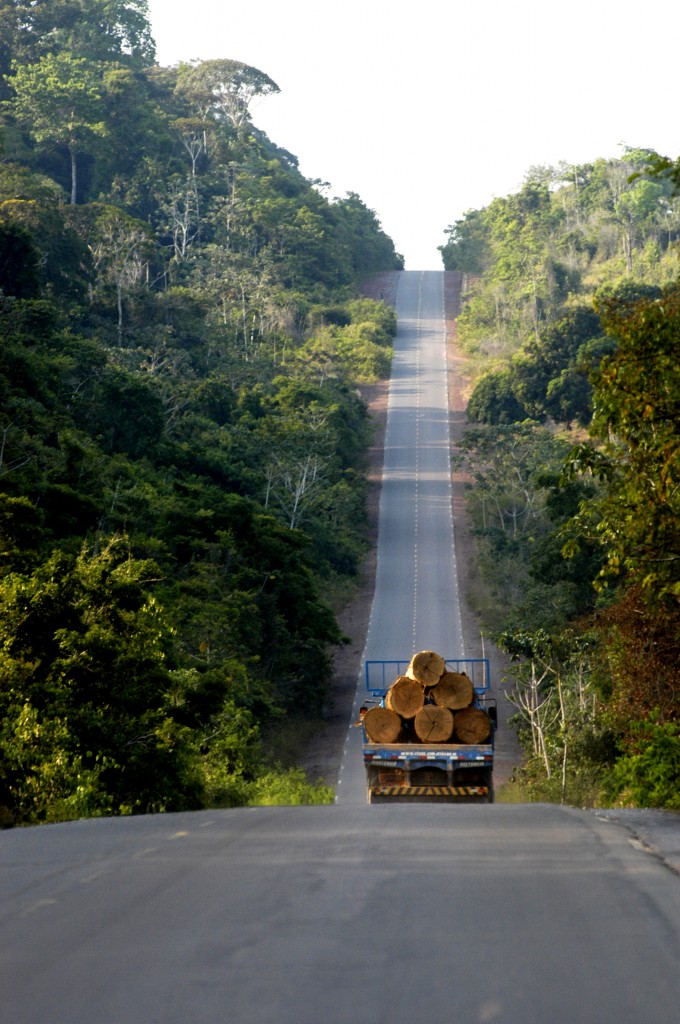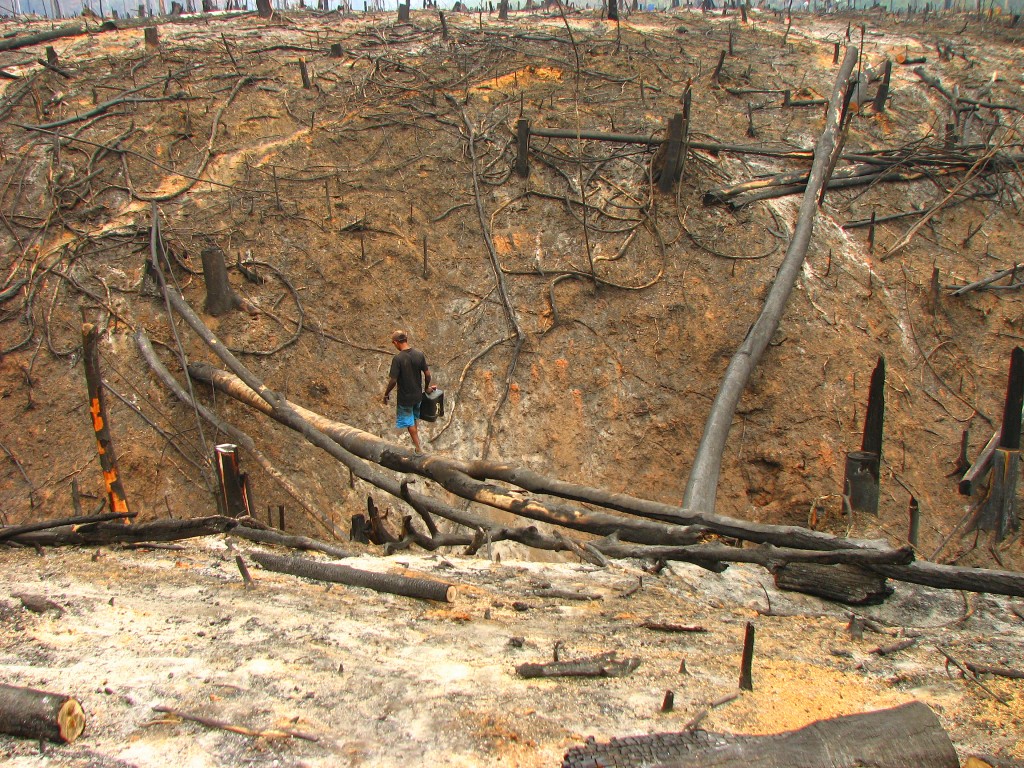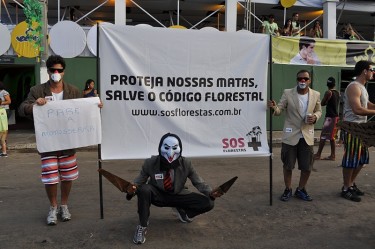This post is part of our special coverage Forest Focus: Amazon and Global Development 2011.
Across the past few weeks, the Brazilian National Congress has been abuzz with the pressure to vote on a new Forestry Code. The project based on proposed changes of the existing Code is backed by a coalition of Deputies of the so-called “Ruralist Front”. The proposed Code raised controversy in mid-2010, as well as in December of the same year, when the matter was rushed forth while environmentalists were away in Cancún for the COP 16.
The proposal under discussion establishes a new management scheme for forests and protected environmental areas in all 6 biomes of Brazil: Caatinga, Cerrado, Pampas, Atlantic Forest, Pantanal and the Amazon. The rationale driving the project is that agribusiness is hindered by the existing Code and Brazil is missing out on opportunities for economic development.

A truckload of timber leaves the Amazon. — Deforestation and the timber industry on the Amazon. Photo by Christian Franz Tragni, copyright Demotix (18/02/2009)
Forestry Code
The proposed Forestry Code fashions a ‘consolidated rural area’ approach with many controversial features: making all cultivated areas legal (granting amnesty to those responsible for deforestation that created them); reducing the amount of riparian or stream-side zones to be protected (called ‘várzeas’ and ‘igapós’ in Portuguese); allowing occupation and use of areas above 1,800 m (which are currently protected) for agriculture; changing the parameters for Permanent Preservation Area (APP) to be replaced by new statutes created in each Brazilian State; eliminating the native reserve requirement in small properties; permits replanting of degraded areas with exotic plants (instead of only native species); allowing compensation for a devastated land with a protected area elsewhere (i.e. a devastated area in the Atlantic Forest could be compensated by a protected area in the Cerrado); and making it no longer compulsory to restore damaged native reserve on small properties.
Rumor has it that the version presented by the federal deputy from the Communist Party Aldo Rebelo to Congress on May 10, 2011, had its draft finalized just moments before the call to vote. The rumor made the voting session be adjourned as the version wasn’t available for appreciation. Former Minister of Environment and presidential candidate Marina Silva (@silva_marina) tweeted on May 10 [pt]:
Não se sabe quais propostas da sociedade e do governo estão no relatório do Aldo. Será um desrespeito se o Código Florestal for votado hoje.
On May 12, as deputies mentioned Marina Silva's message to demand more time to study the report, Aldo Rebelo accused Mrs. Silva's husband of illegal logging. He also stated that he had “spared” Mrs. Silva's husband, as had decided not to press charges.
Based on this statement, which was aired on television, YouTube user CiFuDetube (acronym for Citizenship, Future and Democracy) advised netizens to call for Aldo Rebelo’s impeachment, as he had publicly confessed misconduct.
Agribusiness, the future of Brazilian economy?
According to journalist João Peres [pt], writing for Rede Brasil Atual, the “ruralist front” is made up of 170 deputies and 18 senators who openly support agribusiness and in some cases are farmers themselves. Deputy Kátia Abreu is a well-known member of the ruralist front, being a large producer in the meat industry. Since 2008, she has been the president of the Brazilian Confederation of Agriculture and Livestock (CNA) and is eager to see the new Code approved.
Abreu (@KatiaAbreu) tweeted [pt] that the “modernization of the Forestry Code is being set in a democratic and responsible manner”. She also tweeted in defense of her efforts [pt]:
Não somos desmatadores. Não exploramos madeira em reserva ambiental. Somos produtores de alimentos. Sustentamos o Brasil. #codigoflorestalja
During the COP 16, Deputy Abreu (member of the Social Democrat Party) was awarded the Golden Chainsaw [pt] by Greenpace Brazil, in recognition of “her efforts towards deforestation”.

Rise in deforestation in the Amazon Rainforest – The Brazilian Amazon rainforest had 5.850 km2 of its legal area deforested from August 2009 to April 2010, according to INPE- Instituto de Pesquisas Espaciais. Photo by Ronnie Luis Leite, copyright Demotix (20/11/2007).
Deputy Aldo Rebelo, member of the Communist Party of Brazil (PCdoB), is the rapporteur (sponsor) responsible for the new Forestry Code proposed in Congress. Mr. Rebelo has taken an uncompromising stand for the project. Despite his alliance with the Dilma Rousseff administration, he has shown deeper affinity with the proposal backed by the ruralist front rather then the less aggressive one backed by the Presidential Administration.
Rafael Chiaravalloti writes on his blog Diário do Verde (Green Daily) [pt] about the harmful effects of the new Forestry Code project and calls Aldo Rebelo a puppet doll:
Aldo Rebelo, um ex-militante da luta pela democracia na época que os militares criaram o código, é apenas uma marionete desse processo.
Environmentalists and scientists reject proposal
Concerned with the powerful forces behind the new Forestry Code, environmental NGOs like Greenpeace Brazil and WWF-Brazil and institutes such as ISA – Instituto Socioambiental (Socio-Environmental Institute) – and IPAM – Instituto de Pesquisa Ambiental da Amazônia (Environmental Research Institute of the Amazon) – joined their forces in 2010 to fight against the new Code. The website SOS Florestas (SOS Forests) [pt] aims at offering content to correct the currently widespread misinformation. The argument is that there have been lies [pt] about the way the new Forest Code was elaborated and it is necessary to publicize the potential negative effect on ecosystems in Brazil.
The initiative created an online petition [pt] with Avaaz to maintain the current Forestry Code. On Twitter, the hashtag #SOSFlorestas is used and a video [pt] has been produced to inform about the harmful possibilities of the proposed new code, especially in regards to ending the compulsory reserve of original forest on small properties, and the lower restriction of areas of permanent protection on hills and riversides, which has huge impacts on cities.
The Brazilian Society for the Progress of Science (SBPC) and the Brazilian Academy of Science (ABC) have come forward to argue for a two-year moratorium [pt] on the Forestry Code dialog in Congress. Both institutions agree the Code must be changed, but argue the current proposals lack the scientific data basis needed for new determinations of native reserve, for the adjustment of protected areas on riversides and other changes.
“Aldo Effect”: Deforestation is going up
Just a few days ago, Instituto Centro de Vida (ICV) and Imazon, institutions that conduct research and advocate for the sustainable management of Brazilian biomes, reported that deforestation [pt] went up in the state of Mato Grosso, against the previous trend of lower deforestation rates:
Em abril de 2011 o desmatamento atingiu 243 quilometros quadrados em Mato Grosso, o que corresponde a aumento expressivo de 537% em relação a abril de 2010 quando o desmatamento somou apenas 38 quilometros quadrados.
You can see maps and graphics here [pt] comparing deforestation rates in Mato Grosso over the past four years. As journalist Leonardo Sakamato argues, this is a race to deforest areas, as the new Forestry Code will provide farmers with amnesty. Environmentalists have named it the “Aldo Effect”.

"Protect our woods – Save the Forest Code" Photo from the blog of the AASPAFF (Association for Social Action and Conservation of Water, Fauna and Flora of the northern Chapada), used with permission.
Demonstrations have taken place in other parts of the country, as in the small town of Jacobina, Bahia. SOS Florestas is urging citizens to attend a massive demonstration this Sunday, May 22, in São Paulo.
This post is part of our special coverage Forest Focus: Amazon and Global Development 2011.







20 comments